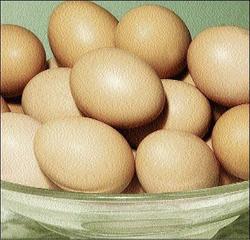
There is a growing appreciation that the overall pattern and amount of foods in a person's diet, and not a single food, is what is important for good nutrition. With this concept the American Heart Association (AHA) dietary guidelines for healthy people no longer has a specific recommendation on the number of eggs or egg yolks a person may consume for the week.
The AHA does recommend limiting cholesterol intake to no more than 300 mg per day, although the association acknowledges that there is no precise basis for selecting a target level for dietary cholesterol intake for all individuals. It has been suggested that about 70 per cent of humans do not have increased blood cholesterol when excess dietary cholesterol is consumed (hypo-responders).
Cholesterol
An average egg contains about 200 mg of cholesterol in the yolk. Egg whites have no cholesterol. If you have coronary heart disease, diabetes, high LDL - cholesterol or other cardiovascular disease, the recommended cholesterol limit is less than 200 mg. You may choose one small or medium egg, with 157 and 187 mg cholesterol respectively and remember to balance the dietary cholesterol in that egg with the other foods you eat that day.
On the other hand, Mutungi et al (2008) reported in the Journal of Nutrition that consuming three eggs per day as part of a carbohydrate restricted diet in overweight men did not increase LDL-cholesterol but was associated with increased HDL-cholesterol (the good type) and a reduction in risk factors for heart disease and stroke.
Egg is a highly nutritious food that is relatively inexpensive. It is an excellent source of high quality protein, choline and the antioxidants lutein and zeaxanthin. Choline is a nutrient essential for normal function of all cells and plays a major role in foetal brain development and memory later in life. Lutein and zeaxanthin are widely known as, "eye-protective nutrients" because of studies associating their intake with reduced risk for age-related cataract and macular degeneration.
Eggs, also, provide significant amounts of several vitamins and minerals. In addition, without the yolk, egg whites are a heart-healthy source of protein without cholesterol. It is reported that many recipes calling for whole eggs come out just as good using egg whites. Each whole egg may be replaced with two egg whites.
Asha Badaloo, PhD, Tropical Metabolism Research Unit, UWI.
EGGS ARE EGG-CELLENT!
Do you make the best omelette in Jamaica? Why not let our judges decide? Send us your recipes and we will select the best of the ones to enter our omelette cook-off during October, National Egg Month.
Enter to win a supply of eggs, $80,000.00 cash and best of all, bragging rights.
Send entries to:
Eggs are Egg-cellent c/o The Gleaner Co., 7 North Street, Kingston or email:lifestyle@gleanerjm.com.

